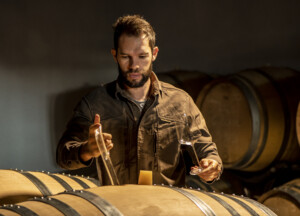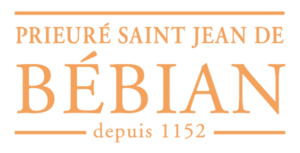Prieure St Jean de Bebian

Benoit Pontenier
About
Owner & winemaker: Benoit Pontenier
Vineyards: 19ha, across 49 different parcels, all estate-owned
Vineyard management: Certified organic with biodynamic practices
Soils: Varied, including galets roulés, limestone, and basalt
Grapes grown: Grenache Noir, Counoise, Cinsault, Mourvedre, Syrah, Grenache Gris, Vermentino, Roussanne, Clairette, Chardonnay
Annual production: 80,000 bottles
Quick facts:
- The first historical record of the estate is of when it was gifted to a Roman centurion, Bébianus, as a reward for his battle exploits.
- The basalt soils are the result of an ancient lava flow. They’re rare to find in southern France, and when mixed with the limestone and large pebbles found across the estate, they create a particularly distinctive terroir.
- Benoit explains his style as the distinction between “grands vins,” extracted and ripe, that are so widespread in Languedoc, and “bons vins,” the pleasurable and easy-to-drink wines he likes to make.
The wines of Prieuré St Jean de Bébian are the product of a place with an incredible history, dating back to antiquity: the first historical record of the estate is of when it was gifted to a Roman centurion, Bébianus, in the first century CE. The Cistercien monks built the priory of St Jean in the 17th century–today, the monumental building is still the centerpiece of the property and now serves as a hotel and restaurant.
The “modern” history of the estate begins in 1960, when Alain Roux took over the property. There were already beautiful old vines on the property, and he expanded the plantings with help from his famous neighbors: Syrah from Gérard Chave, Grenache from Jacques Reynaud, and Mourvèdre from the Peyraud family. His work established St Jean de Bébian as one of the pioneers showing the potential to make top-quality wines in this part of France.
Today, St Jean de Bébian has some of the most beautiful old vine plantings in the Languedoc. The vines are planted across a wide diversity of soils, including galets roulés from ancient riverbeds, limestone deposits, and volcanic basalt soils. These volcanic soils in particular are rare to find in southern France, and when mixed with the limestone and large pebbles found across the estate, they make up a terroir that’s almost unique to St Jean de Bébian, producing extraordinary and singular wines.
Benoît Pontenier took over as winemaker in 2016, and his goal is to respect the history of the estate while also making wines that express his personal vision. “I want to make the wines that I like to drink!” he exclaims. “I’m not a fan of the over-extracted and ripe wines that can be made too easily in our region. I want to make vins de paysan with lots of flavor but also lots of pleasure to drink. It’s what I call ‘bons vins‘ in contrast to the ‘grands vins‘ which are in demand in some places.”
In order to achieve this vision, he works tirelessly in the vineyards to achieve perfectly ripe and healthy fruit and uses a significant portion of whole clusters. He prefers to work without added sulfites, asserting that in his opinion, “this additive snuffs out the wine, rendering it less luminous, drinkable, and sapid.” To compensate, he emphasizes the importance of perfect hygiene in the cellar. As he sums it up,”for vinification, I control little and tolerate a lot.”
The resulting wines have a remarkable energy, with complexity that invites contemplation as well as freshness that invites you back for another sip. “I attach tremendous importance to the finish of a wine,” Benoît tells us. “It’s fundamental–it’s what you remember, like the end of a book or a film. I hope that people have this sensation of vibration or salivation when they taste a very good wine without artifice. Once you know this feeling, it’s very difficult to go back to more boxed-in wines.”

